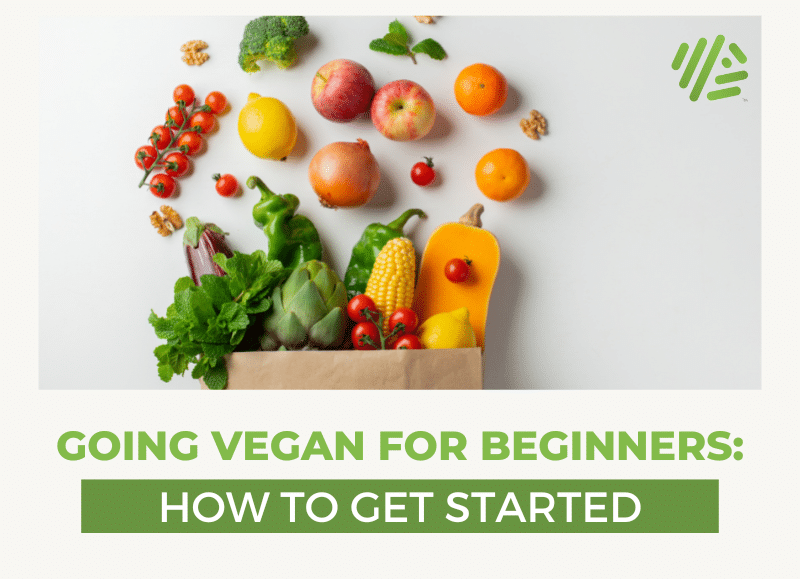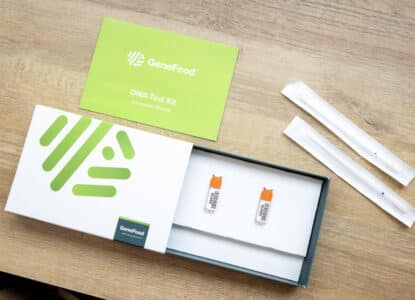Going Vegan For Beginners: How to Get Started

Contents
Reader’s note: the opinions expressed in this post are of the author and do not necessarily reflect the views of our editorial staff.
There are plenty of good reasons to adopt a vegan lifestyle – physical and mental health, environmental concerns, animal ethics, human ethics, etc. Regardless of what swayed you towards veganism, though, it’s smart to recognize that cutting out a whole swath of foods you might normally eat can also mean missing out on easily accessible sources of vital nutrients. So, if you’re in it for the long-term, it pays to pay attention to your diet right from the get-go.
In this ‘Beginners Guide to Veganism’, I’ll take a look at the key nutrients you need to watch out for when adopting a totally plant-based diet.
Is a plant-based diet safe?
A vegan diet that relies too much on processed foods, lacks variety, and/or is packed with things that block nutrient absorption and/or deplete nutrients, can quickly get you into trouble when it comes to your health.
After more than thirteen healthy years as a vegan (and on a writer’s budget!), I can say with complete confidence that a healthy, inexpensive, vegan diet is not only possible (for most people) but can also be delicious. That said, I did spend more than six years studying nutrition, so I have a keen sense of where and how to get the nutrients I need to stay healthy. This also means that I know all too well that most folks don’t learn about nutrition in school, which puts omnivores and vegans alike at risk of nutrient insufficiencies that can leave you feeling subpar, and outright nutrient deficiencies that cause serious and irreversible damage to health.
What are the health risks for vegans vs. omnivores?
For omnivores, the risks associated with poor dietary choices tend to come in the form of cardiovascular disease, diabetes, and fatty liver disease. These health issues typically stem from a diet containing too much saturated fat and heme iron from meat and dairy, chemical contaminants from cooked animal flesh (including polycyclic aromatic hydrocarbons, heterocyclic amines, and advanced glycation end products), and too little fiber and phytonutrients from plants. Fiber and phytonutrients are only found in plant foods, with phytonutrients comprising thousands of compounds including glucosinolates, carotenoids, and flavonoids that have antioxidant and anti-inflammatory activity to protect against the onset of disease and disease progression.
Unsurprisingly, then, epidemiologists regularly point out that “the most important dietary risks in the United States are diets low in fruits, low in nuts and seeds, high in sodium, high in processed meats, low in vegetables, and high in trans fats.”
For vegans, then, the risks are a little different. While it’s certainly possible to eat too much saturated fat, trans fats, and sugar, and to lack fiber and phytonutrients if you eat an overly processed vegan diet, health issues in vegans may be more likely to take the form of fatigue, nerve damage, low mood and impaired immune function. This is because several key nutrients are that little bit harder to come by on a diet that doesn’t involve animal products.
Nutrients to watch out for when you’re going vegan
Plant-derived foods lack one nutrient in particular and provides others in forms that can be hard for the body to absorb and use. Plant-based diets also tend to be higher in substances and compounds that inhibit the absorption of several vitamins and minerals, compared to an omnivorous diet. As a result, vegans may have a greater risk than omnivores of getting too little of the following key nutrients:
- Vitamin B12
- Vitamin D
- Zinc
- Iodine
- Long-chain omega-3 fatty acids.
Notice how iron isn’t in that list? Here’s why….
Zinc and veganism
Ah, zinc. The busybody of the mineral world. Zinc plays a role in hundreds of enzyme systems in the body and is vital for immune system activity, reproductive health, healing, digestion, and a whole host of other essential processes.
Unfortunately, while zinc is present in a wide selection of plant foods (nuts, seeds, grains, legumes, etc.), its absorption can be inhibited by phytates found in the very same foods. Dietary phytate-to-zinc molar ratios are used by some health authorities to estimate zinc bioavailability and to identify dietary zinc requirements according to the type of diet a person eats. The European Food Safety Authority has set adult dietary zinc (and iron) requirements based on four levels of phytate intake, for instance.
Most of us don’t need to worry too much about this, however. As with iron, zinc absorption is much improved by simply eating foods that have been prepared using fermentation, germination, soaking, or cooking. These traditional processes break down the phytic acid so you can absorb the zinc more easily. Tempeh is a good source of zinc, for example, compared to non-fermented soy products such as tofu. Ensuring a good intake of organic acids, from fresh fruits and vegetables, at every meal will also support better zinc absorption.
And, as with iron, after a few months on an exclusively vegan diet, your body will likely have upregulated zinc absorption from plant-based foods.
Zinc deficiency is much more likely to occur in raw food vegans who tend to eat mainly fruits and vegetables, which are poor sources of zinc. These foods also contain oxalic acid which inhibits the absorption of zinc. Including sprouted legumes and grains in such a diet can help, and raw food vegans who experience a sense of ‘lightness’ and ‘euphoria’ after a few weeks or months of their new diet might want to get their zinc levels checked as this could be a symptom of deficiency.
For peace of mind, I’d recommend taking a good quality vegan multivitamin and mineral supplement during the first year of veganism at least. That way, you can be confident that you’re covering all your bases while your body gradually adapts. If you were already vegetarian before turning vegan, you may have a slight advantage over your fellow vegans who jumped right into veganism from an omnivorous diet. That’s because your body will already have upregulated absorption of iron and zinc to some extent.
A good multinutrient supplement can also ensure that you’re getting enough of the other nutrients that may pose problems when switching to veganism, including vitamin B12.
For more on zinc, see John’s post about his experience with zinc supplements.
Vitamin B12 and veganism
Vitamin B12 is synthesized by bacteria and, as such, is primarily found in animal-derived foods such as dairy, meat, eggs, and insects. There are, however, many foods fortified with vitamin B12 that are suitable for vegans, including some (but not all) nutritional yeast, cereals, plant milks, and even some desserts. As the levels of vitamin B12 in these foods can be inconsistent, and absorption of B12 is tricky without sufficient stomach acid and something called intrinsic factor, I highly recommend that everyone (vegan or not) takes a good quality vitamin B12 supplement daily or weekly (depending on the dose).
Before taking a B vitamin supplement, please see our guide to B vitamin supplements and cancer risk.
We can store vitamin B12 in our bodies for around 3-5 years, so new vegans who previously ate animal-derived foods rich in B12 might be able to coast for a little while before stores run low. This is a very bad idea though, as vitamin B12 deficiency is no joke.
There’s a reason why vitamin B12 deficiency anemia is called pernicious anemia: deficiency symptoms of this nutrient can take years to show themselves, and once they do, the damage is often irreversible and extensive. It can also be tricky to detect vitamin B12 deficiency, given that a whole range of things can skew the results of the blood tests that are available.
We need vitamin B12 for the health of the nervous system, red blood cell production, the breakdown of homocysteine, and for RNA and DNA production, among other things. Some of the symptoms of vitamin B12 deficiency can be masked by a good intake of folic acid, which is why many people don’t know they are deficient in B12 until they have serious nerve damage that cannot be reversed.
Seniors are especially at risk of vitamin B12 deficiency because stomach acid production is often lower in older adults, and older adults are also more likely to take medications such as metformin and proton pump inhibitors that deplete B12 or affect absorption. In fact, some estimates suggest that more than 15% of older adults are vitamin B12 deficient, while other research has found an association between low B12 levels in seniors and reduced brain volume, higher homocysteine levels, and poorer cognitive performance.
Most vitamin B12 supplements are in the form of cyanocobalamin, which requires stomach acid for absorption. Cyanocobalamin also has to be converted into the body into one of two active forms of B12, methylcobalamin or adenosylcobalamin. As such, the smart move for vegans, and everyone really, is to take a methylcobalamin supplement daily (250 mcg or so should be sufficient) or a larger dose once a week to keep B12 levels topped up.
For more on how to get adequate B12 as a vegetarian, see B12 for vegetarians: what you need to know.
Veganism and Vitamin D
Vitamin D is another nutrient that is lacking in plant foods, unless fortified. There is some vitamin D in mushrooms, but this is an unreliable source. Oily fish and cod liver oil are rich in vitamin D, but the main source of vitamin D for most people is sunshine!
Vitamin D is actually a hormone, not a vitamin, and is synthesized from cholesterol. Initially, vitamin D takes the form of 7-dehydrocholesterol, which is then converted to previtamin D3 when skin is exposed to ultraviolet light. Once this previtamin D3 enters circulation, it is converted into its active form, 1,25-dihydroxyvitamin D3 (1,25-[OH]2-D3), in a two-step process that occurs in the liver and kidneys, with the latter step requiring magnesium.
Because vitamin D synthesis is rather convoluted, it shouldn’t surprise you to learn that genetic polymorphisms have been identified that can impair the body’s ability to perform these conversion steps. While rare, genetic defects in vitamin D metabolism can lead to rickets and osteomalacia, the painful and debilitating bone conditions affecting children and adults respectively. Blood tests for vitamin D typically test for the intermediary metabolite, 25-hydroxyvitamin D.
Active vitamin D is essential for the absorption and use of calcium and plays a key role in building and maintaining healthy bones and teeth. Vitamin D also plays a role in muscle function, immune system activity, heart and cardiovascular function, cell division, insulin secretion, and cognitive function. Vitamin D modulates many genes that encode proteins that regulate cell proliferation, differentiation, and apoptosis.
During the summer months, most of us can create enough vitamin D to support good health with just ten or fifteen minutes of sun exposure (assuming a decent amount of your skin is bare and not covered in sunscreen). From October to March/April, however, the sun isn’t strong enough in much of North America to facilitate vitamin D synthesis. Melanin also reduces vitamin D synthesis in the skin, which means darker skinned people also have a higher risk of vitamin D deficiency. And, unfortunately for seniors, our ability to synthesize vitamin D in the skin is diminished with age. This means that many seniors, who are often outdoors less than younger folks, have an even greater risk of vitamin D deficiencies and resulting health issues, including osteoporosis.
To make sure you’re getting enough vitamin D all year round, it’s best to take a daily supplement or to eat foods fortified with the nutrient. This is true for vegans, vegetarians, and most omnivores, given that many epidemiologists now consider vitamin D deficiency to be widespread.
For a long time, the only vegan option for vitamin D supplements was vitamin D2, typically derived from mushrooms or yeasts exposed to UV light. Most vitamin D supplements are in the form of vitamin D3 (cholecalciferol) derived either from fish or from lanolin, the fatty fluid extracted from sheep’s wool. Vitamin D2 (ergocalciferol) supplements tended to be more expensive, harder to track down, and, it turns out, just aren’t all that great for raising vitamin D levels, compared to vitamin D3.
Happily, vegan vitamin D3 supplements now exist! The D3 in these supplements is derived from lichen and is exactly the same as animal-derived vitamin D3. The Institute of Medicine states that serum 25-hydroxyvitamin D levels of at least 20 ng/mL (50 nmol/L) are likely adequate for health for around 97.5% of the population. To maintain those levels, a daily intake of 600 IU or 15 mcg is recommended for most adults and children.
Vegans and Iodine
Iodine is an essential element needed for healthy thyroid gland function. As such, iodine is vital for energy production and proper growth and development. Vegans tend to have higher rates of iodine insufficiency or outright deficiency because plant sources are rather unreliable, thanks to inconsistent soil levels of iodine. Vegans are also more likely to eat foods that contain goitrogens (antinutrients that inhibit thyroid function). Such foods include soy products, cruciferous vegetables, spinach, peanuts, pine nuts, sweet potatoes, millet, peaches, pears, and strawberries. Rather than cutting out these foods (which offer a wealth of other important nutrients) for fear of thyroid dysfunction, the best approach is to simply ensure a good daily intake of iodine.
Sea vegetables and iodized salt are the main dietary sources of iodine available to vegans. Vegans who eat a plant-based diet for health reasons may also cut down on salt intake or use specialized salts that aren’t iodized, which could leave them lacking iodine. This doesn’t mean vegans should start sprinkling salt on everything, especially if hypertension is an issue.
Just a half teaspoon of iodized salt provides 150 mcg of iodine, which is the recommended daily dose. Seaweeds such as dulse and nori are good sources of iodine, while kelp tends to have toxic levels of iodine and is best avoided. The level of iodine in sea vegetables is inconsistent, however, so a daily multivitamin and mineral supplement that includes iodine can help ensure you get what you need each day.
Vegans and Omega-3 Fatty Acids
Omega-3 essential fatty acids are another potential area of concern for vegans. Fish oil and eggs are the main dietary sources of the long-chain fatty acids docosahexanoic acid (DHA) and eicosapentanoic acid (EPA) needed for good health. We have some capacity to convert the shorter-chain omega-3 fatty acid alpha linolenic acid (ALA) found in chia seeds, flaxseeds, walnuts, hemp seeds, and leafy greens to DHA and EPA, but this capacity is somewhat unreliable, especially in our later years, and may prove insufficient for good health.
The pathway via which the body produces EPA and DHA from ALA relies on two key genes: desaturase 1 and 2 genes (FADS1 and FADS2). Single nucleotide polymorphisms (SNPs) in these genes can have a major impact on how well a person is able to convert ALA, meaning that some people are more vulnerable to low dietary intake of EPA and DHA than others. For example, anyone who carries the minor allele in one or more SNP(s) in FADS1 and/or FADS2 has reduced activity in the desaturase enzymes, which impairs this important conversion. Fortunately, research suggests that consuming extra ALA can increase EPA and DHA to the same level as someone carrying the major allele.
And, conveniently, vegans can now get readymade EPA and DHA from the same place fish get their long-chain omega-3s: algae. In fact, plant sources of EPA and DHA are arguably preferable to fish and fish oil because they tend not to contain the contaminants that accrue in fish, including radioactive materials. This means algal oil requires less processing to remove heavy metals and industrial pollutants and is more ocean-friendly and environmentally sustainable.
Taking a daily algal oil supplement is the most convenient way to ensure you’re getting all the omega-3 you need for great health, but if you’re vegan and dislike taking supplements or are on a budget, it’s sensible to double the recommended intake of ALA (to 2.2-3.2 grams per day), cut down on vegetable oils, and eat a varied diet that provides all the vitamins and minerals required for converting ALA to EPA and DHA.
Conclusion
Going vegan, even for a short time, can be one of the best things you ever do for your health, the health of the planet, the wellbeing of your fellow humans and the welfare of non-human animals. It can lead you down fun culinary avenues, encourage a more mindful and healthy way of eating, garner you new friends and an appreciation of intersectional politics or…. be completely disastrous for your health.
Being an unhealthy vegan is just as easy as being an unhealthy omnivore, if not more so. The difference is, very few people will immediately ascribe any symptoms of illness to your diet and offer you ill-informed advice over what you should and shouldn’t eat if you’re omnivorous. As with any major dietary change, it’s a good idea to work with a properly qualified nutritionist and/or do your research when you go vegan, so you can be sure you are getting all the nutrients you need to stay healthy. Having this support in place, especially during your first year of veganism, can help you avoid dietary pitfalls and weather any challenges, so you can live long and prosper.



